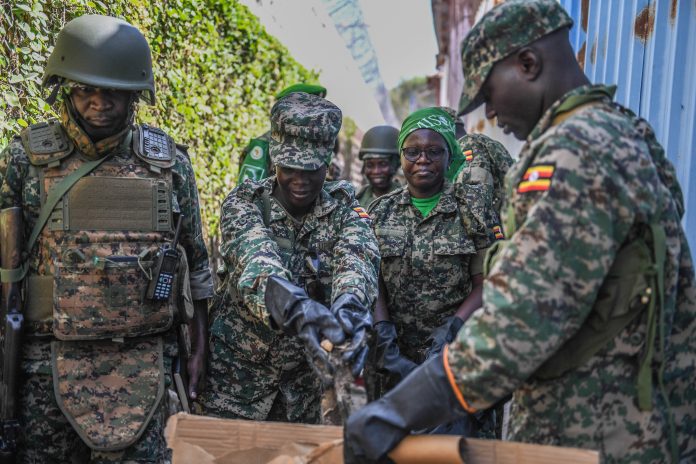Mogadishu (Caasimada Online) – Somalia could face a significant collapse of state institutions when the African Union Transition Mission in Somalia (ATMIS) concludes by the end of 2024, security experts warn.
Security experts suggest such an outcome may be inevitable unless the United Nations lifts the prevailing weapons embargo on the country.
The initial steps toward this outcome are already in motion. Somali authorities and African Union officials announced earlier this week a phased drawdown of ATMIS.
By June 30 of this year, the operation intends to withdraw 2,000 soldiers as a prelude to the complete withdrawal of the African Union Mission in Somalia.
This mission, initiated in 2007, was subsequently replaced by ATMIS in 2022.
Voices of concern
Abdisalam Yusuf Guled, founder of Eagle Range Services and former deputy chief of Somalia’s National Security Agency, has expressed significant concerns over the proposed withdrawal.
“My concern is that Somalia could become another Afghanistan if the African Union troops withdraw without Somalia possessing strong, well-armed security forces with international funding and backing,” said Guled.
He draws a direct comparison to the swift collapse of the Afghan government after U.S. troops withdrew in August 2021.
Despite the warnings, the Somali government stated readiness to take over security responsibilities from ATMIS last week.
A technical team was appointed with ATMIS and the U.N. Support Office in Somalia to oversee the implementation of the ATMIS drawdown.
However, security experts contend that a swift pullout of African Union troops could potentially trigger the collapse of the Somali government.
Colonel Abdullahi Ali Maow, a former Somali intelligence official, told VOA, “ATMIS withdrawal will encourage al-Shabab to remobilize and launch more brazen attacks on the Somali government.”
Mixed views on militant threat
Contrary views exist regarding the potential threat from militants. Former deputy chief of Somalia’s National Intelligence and Security Agency, Ismail Dahir Osman, believes the militants are on a downward spiral.
He posits that they pose no significant danger to Somalia’s government once African troops depart.
“I believe the donor countries and the United Nations will direct ATMIS funding to Somalia’s National Army. If so, there will be no chance for al-Shabab to pose a significant threat to Somalia’s institutions,” said Osman.
Omar Abdi Jimale, a political science lecturer in Mogadishu, echoes this sentiment.
He argues that the Somali National Army can shoulder security responsibilities with genuine international support.
Phase two of the operation
Under the leadership of Somali President Hassan Sheikh Mohamud, the Somali National Army, with the support of ATMIS and anti-al-Shabab clan militias, dislodged the Islamist insurgency al-Shabab from significant portions of central Somalia in 2022.
Despite the successful operation, the counteroffensive against al-Shabab has stalled this year.
The militants have used this opportunity to remobilize, culminating in significant attacks, including a May 26 storm on an A.U. base and a siege of a beachside hotel in Mogadishu.
In response, a second phase of the offensive is being planned. Troops from neighboring countries, Djibouti, Ethiopia, and Kenya, are prepared for immediate deployment to Somalia.
“The new phase aims to flush out al-Shabab from the remaining parts of the country under its control,” said top Somali military commanders on condition of anonymity.
In preparation for ATMIS’ full withdrawal, senior ATMIS commanders recently met with top U.S. military officials to discuss the transition.
Lt. Gen. Sam Okiding, after the meeting, stated, “We are in the transition process, so as ATM exits, we should be proud of our brothers and sisters who remain behind to take charge of their country’s security.”
The long-standing international partnership, particularly with the United States providing security assistance, has been instrumental in Somalia’s journey toward stability and self-reliance.
The transition of power from ATMIS to the Somali National Army is a testament to this support and the commitment of the Somali people.


